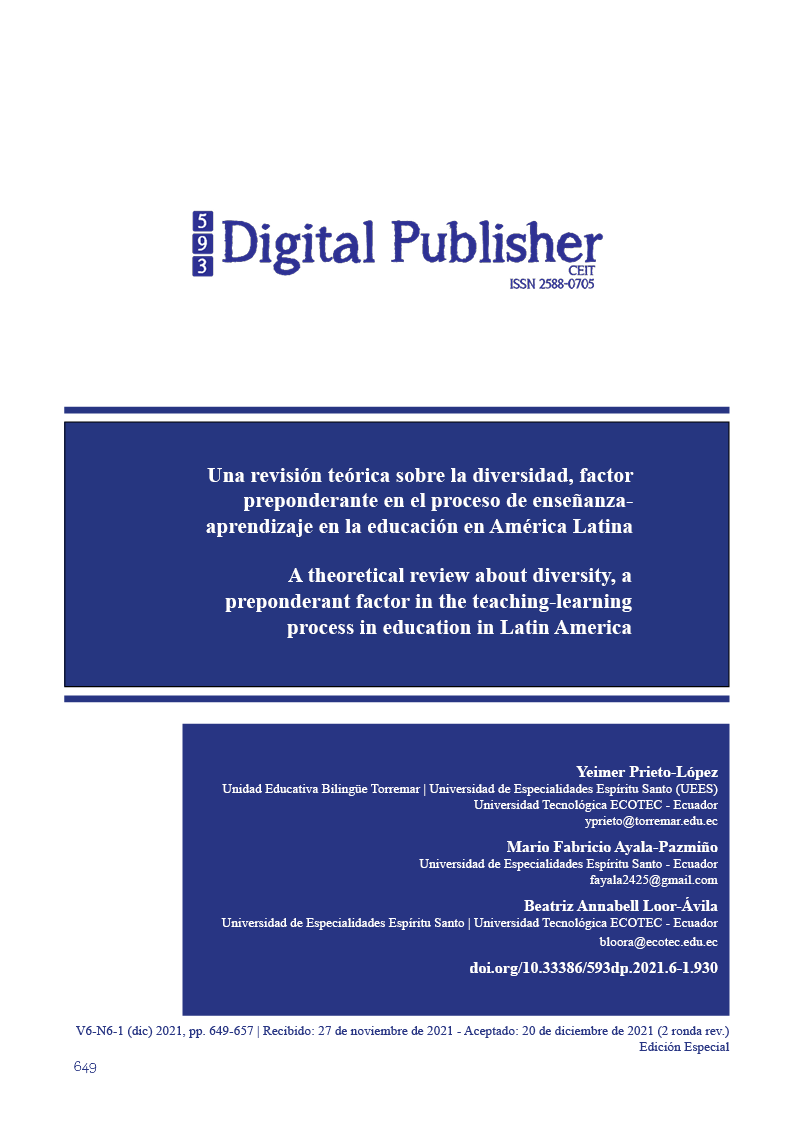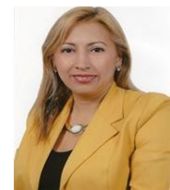A theoretical review about diversity, a preponderant factor in the teaching-learning process in education in Latin America
Main Article Content
Abstract
In this scientific research, a study is carried out on the formation and development of the personality of the new generations from the Elementary Basic Education in Latin America. Here, attention to diversity represents a challenge and a priority not only for the Student Counseling Department (DECE) but also for teachers and managers, carrying out an analysis of key terms such as diversity, individuality, integration, segregation, homogeneity, individual, differentiated and personalized approach, attention to individual differences, and schools open to diversity.
In the development of this article, qualitative and theoretical research prevailed, highlighting methods such as the historical-logical for determining the main theoretical and methodological foundations that sustain the variables and the conceptualization and definitions. Furthermore, the theoretical systematization made it possible to obtain the latest research on the field.
Based on the conceptualization of children with Special Educational Needs (SEN) in Latin America, actions are used to offer higher quality education to students with special educational needs and the entire school population in general. Attention to diversity is for students with a specific SEN and for all students enrolled in an educational institution since they are diverse, and equal opportunities must be given to all students.
This article presents the meaning of educating in and for diversity from the new proposals this term has been reaching in recent times, especially under the inclusive education perspective. This new trend argues that schools should be for all, that no student, whatever their characteristics, should be excluded from education. It also defines the concept of inclusion, its main characteristics, and the principles that sustain it. Finally, a series of decisions and strategies are offered at the end of this study, and some changes must be applied so that each child can attend and learn in their school.
Downloads
Article Details

This work is licensed under a Creative Commons Attribution-NonCommercial-ShareAlike 4.0 International License.
1. Derechos de autor
Las obras que se publican en 593 Digital Publisher CEIT están sujetas a los siguientes términos:
1.1. 593 Digital Publisher CEIT, conserva los derechos patrimoniales (copyright) de las obras publicadas, favorece y permite la reutilización de las mismas bajo la licencia Licencia Creative Commons 4.0 de Reconocimiento-NoComercial-CompartirIgual 4.0, por lo cual se pueden copiar, usar, difundir, transmitir y exponer públicamente, siempre que:
1.1.a. Se cite la autoría y fuente original de su publicación (revista, editorial, URL).
1.1.b. No se usen para fines comerciales u onerosos.
1.1.c. Se mencione la existencia y especificaciones de esta licencia de uso.
References
Ainscow, M. (2015). Developing inclusive education systems: what are the levers for change. Journal of Educational Change, 6: 109-124.
Andersen, G.G. (2018). Teacher perceptions of a culture of thinking. Advanced Education Programs Faculty Publications, 3, https://scholars.fhsu.edu/aep_facpubs/3.
Arnaiz, P. & De Haro, R. (2004). Citizenship and interculturality: keys to education in the 21st century. Education Siglo XXI, 22, 19-27.
Ayala-Pazmino, M., & Prieto-Lopez, Y. (2021). La pedagogía de la enseñanza del pensamiento: Hacer visible el pensamiento. 593 Digital Publisher CEIT, 6(4), 177-183. https://doi.org/10.33386/593dp.2021.4.517
Baker, B. (2012). The hunt for disability: The new eugenics and the normalization of school children. Teachers College Record, 104: 663-703.
Barrio, J. L. (2009). Towards an inclusive education for all. Complutense Journal of Education, 1 (20), 13-31. Benhabib, S. (2006). The other's rights. Barcelona: Gedisa.
Dajani, M.M.J. (2016). Using thinking routines as a pedagogy for teaching English as a second language in Palestine. Journal of Educational Research and Practice, 6(1), 1-18. 10.5590/JERAP.2016.06.1.01.
Erevelles, N. (2015). Deconstructing difference: doing disability studies in multicultural contexts. En S. Danforth y S. Gabel, Vital questions facing disability studies in education (pp. 347-362). N.Y., New York: Peter Lang.
Ferri, B. A. (2016). Teaching to trouble. En S. Danforth y S. Gabel, Vital questions facing disability studies in education (pp. 289-306). N.Y., New York: Peter Lang.
Genovese, A. (2018). For an intercultural pedagogy. Bologna: Universitá degli Studi.
Golding, C. (2011). Educating for critical thinking: thought‐encouraging questions in a community of inquiry. Higher Education Research & Development, 30(3), 357-370. 10.1080/07294360.2010.499144
Graham, L. (2006). Caught in the net: a Foucaultian interrogation of the incidental effects of limited notions of inclusion, International Journal of Inclusive Education, 10: 3-25.
Martínez-Domínguez, B. (2019). Lights and shadows of the measures of attention to diversity on the path of educational inclusion. Interuniversity Journal of Teacher Training, 70, (25.1), 165-184.
Peterson, J.J. (2021). Visible thinking: A distributed cognitive process to self-manage cognitive load. United States Army Research Institute for the Behavioral and Social Sciences. https://apps.dtic.mil/sti/pdfs/AD1124593.pdf.
Portera, A. (2019). Intercultural education in Europe: epistemological and semantic aspects. In A. García and A. Escarbajal de Haro (Coords.), Sociocultural pluralism, education and interculturality (pp. 243-266). Badajoz: Alphabet.
Rice, N. (2006). Teacher education as a site of resistance. En S. Danforth y S. Gabel, Vital questions facing disability studies in education (pp. 17-31), N.Y., New York: Peter Lang.
Vygotsky, L. (1987). Un aula para pensar: Aprender y enseñar en una cultura del pensamiento. Buenos Aires. Aique.




